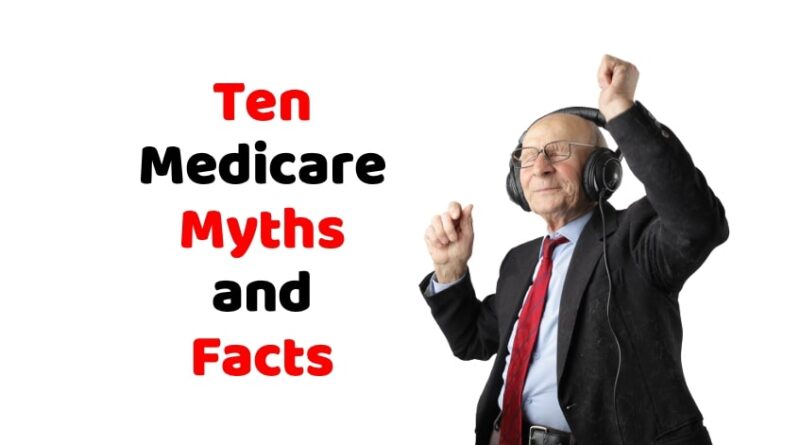Ten Medicare Myths and Facts
Ten Medicare Myths and Facts
Medicare is a social insurance program that provides health care coverage for Americans 65 and older. Unfortunately, there are numerous myths about this program.
Politicians often spread Medicare myths. Medicare is a government-sponsored health insurance program that provides medical coverage for people with limited income and resources.
Myth No.1 – “It doesn’t cover my medical expenses”
Fact: This is one of the most common myths about Medicare. Indeed, Medicare doesn’t pay for everything, but it does cover many medical expenses such as doctor visits, hospital stays, and prescription medications.
Medicare Myth No.2 – “My employer pays for this”
Fact: This is people commonly share the second myth I want to talk about that with Medicare.
Many people know that Medicare is a government-funded health care program for those 65 years and older. Unfortunately, this means that if you are under 65, you will not be eligible for benefits.
This myth has been around for decades, a common misconception among many Americans. Private insurance companies don’t provide coverage for those under 65 – only public insurance programs do.
Medicare Myth No.3 – “I don’t want to pay more in taxes if I opt out of Obamacare”
Fact: The federal government taxes the income of everyone, including those who Obamacare does not cover. However, some people are not covered by the Affordable Care Act. It includes certain employers and individuals making less than $25,000 per year who do not have to pay taxes on their income.
Medicare Myth No.4 – “Only old people are on Medicare”
Fact: This is a common myth that people believe about Medicare. However, many people on Medicare are not old, and there are elderly individuals on Medicare who would not be if they were not disabled.
Medicare is accessible for specific individuals with disabilities who are under age 65. These people probably got Social Security Disability benefits for a very long time or have End-Stage Renal Disease (ESRD) or Amyotrophic Lateral Sclerosis (ALS, otherwise called Lou Gehrig’s disease).
Medicare Myth No.5: Medicare is a government program run by the federal government.
Fact: The Truth: Medicare is a federal health insurance program for people aged 65 and over, funded by the federal and state governments. The federal government runs the Medicare program, but state governments support it.
This leads to variations in what programs and services are offered depending on the state in which a person lives. In addition, the program is funded through premiums and taxes, with some states having additional funds for certain benefits or drugs.
Medicare Myth No.6: The cost of Medicare will explode in just a few years.
The Truth: The cost of Medicare has risen at an average rate of 2% each year since 2010, which is lower than the inflation rates in recent years.
Medicare Myth No.7: A person on Medicaid for more than three months cannot qualify for Medicare coverage.
The Truth: People can qualify for Medicare coverage if they have been on Medicaid for less than three months and have not had other health insurance coverage. Medicaid eligibility is determined by who is eligible for Medicaid and their household’s income.
Medicare Myth No.8: Medicare will not pay for qualifying medical expenses if the person has other health insurance.
The Truth: If a person has both Medicare and other health insurance, the cost of their qualifying medical expenses will be paid by whichever plan covers them first.
As long as a person has both Medicare and other health insurance, their eligible medical costs will be paid for by whichever plan covers them first.
Medicare Myth No.9: If you have a pre-existing condition, you can’t get Medicare
Fact: Pre-existing conditions do not affect your eligibility for enrollment in Medicare; however, some states may prevent you from getting certain benefits.
Medicare Myth No.10: Myth: Medicare doesn’t cover mental health matters.
Fact: Medicare Part B covers mental health services. You get benefits as an outpatient, such as through a clinic or licensed therapist’s office. It also covers counseling services and psychiatric evaluation.
FAQs
1)- What is Medicare?
Medicare is a federal health insurance program designed for those over 65 and those who are disabled. It is not just for people in the final years of their life but also those with a disability that prevents them from working. General tax revenues fund the program.
The program offers health care services to over 29 million people per year. Medicare is primarily funded by payroll taxes, premiums, and general revenue.
2)- Who is eligible for Medicare?
Medicare is a government-sponsored program that primarily provides health coverage to people aged 65 or older and some disabled people of all ages.
1)- 65 Years of age or Older
2)- People with End Stage Renal Disease (permanent kidney failure requiring dialysis or transplant)
3)- Non-exempt from Medicare taxes
4)- Not in prison ( If you are in prison, the correctional facility will pay for your care)
3)- What is meant by Medicare Part A-B-C-D?
Medicare is divided into four basic parts: A, B, C, and D.
– Medicare Part A covers expenses related to hospitalization, including inpatient care, nursing home care, and some long-term stays in hospitals.
– Medicare Part B covers doctor visits, outpatient care, diagnostic tests, and other health services that are not hospital-related.
– Medicare Part C helps people with certain types of nursing home care, home health services, and hospice care.
– Medicare Part D helps people with prescriptions, dental and eye services, and other expenses related to medicine.

4)- What is the difference between Medicare and Medicaid?
Medicare is a federal health insurance program that provides hospital, medical, and long-term care services to people over age 65 or with a disability.
It also helps with financial needs when you’re disabled and can’t work. Medicaid is an insurance program that provides aid for people of low income and low assets.
Related Posts:
2- The 10 Most Common Mental Health Myths
3- How Does Good Health Contribute To Career Success?




